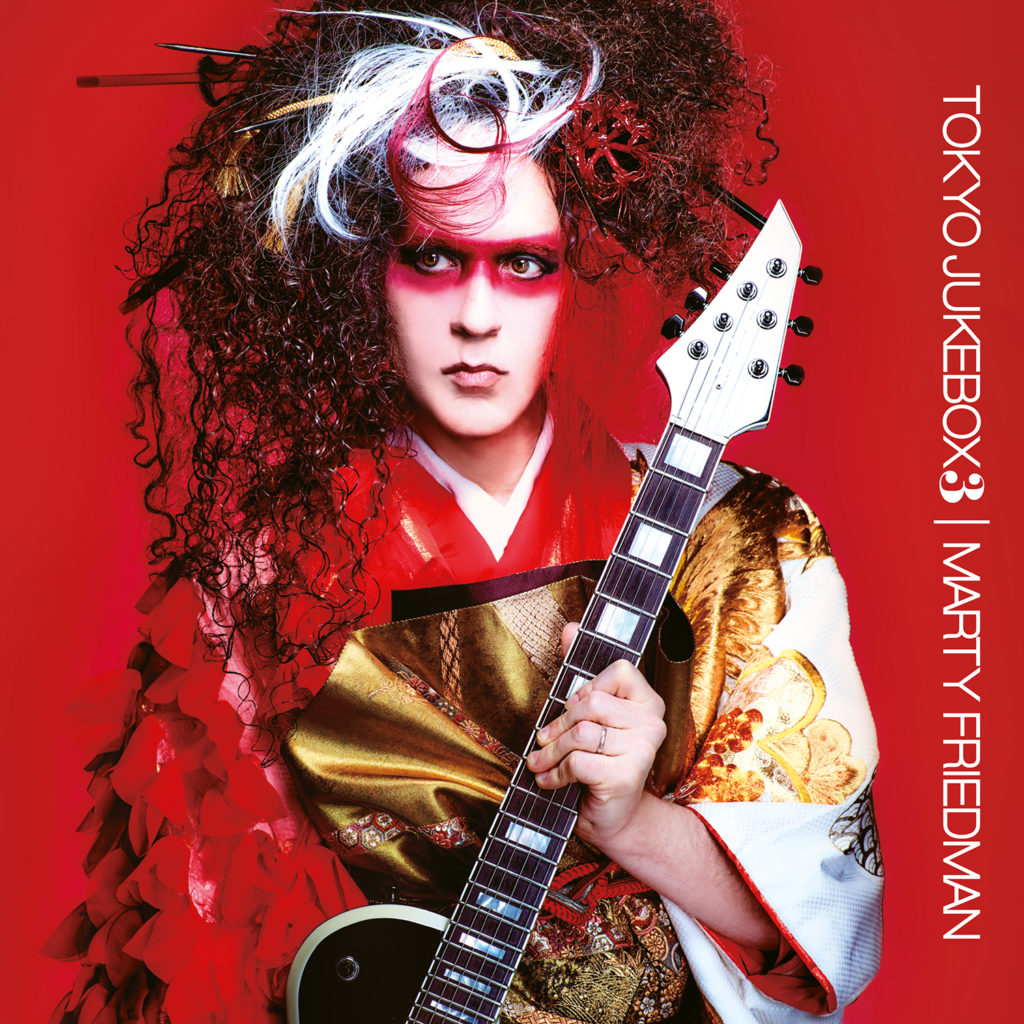Marty Friedman is an American-born musician, probably best known for his 10-year tenure as the lead guitarist for MEGADETH long, long ago. Early on, he developed a knack for mixing exotic scales and metal in a somewhat similar spirit to guitarists such as Steve Vai and Tosin Abasi of ANIMALS AS LEADERS. Just grab any music theory book designed for guitarists and I bet Friedman‘s name pops up in the section about the Japanese pentatonic scales. He seems to have a particular fondness for these scales for their distinct oriental flavor. Deriving from the tuning system of the koto, the Japanese pentatonic scales put an extra emphasis on the darkness of the half-step rather than the perfect intervals. They add a certain bite to the music, a peculiar yin & yang duality. It has been the defining quality of Friedman’s work with both MEGADETH and Jason Brecker‘s CACOPHONY, let alone his thirteen solo albums. The album series that kicked off with “Tokyo Jukebox” in 2009 and then “Tokyo Jukebox 2” in 2011 is finally becoming a trilogy with the advent of the new Marty Friedman studio album, “Tokyo Jukebox 3,” to be released on April 16th, 2021, via The Players Club/Mascot Label Group. The new album consists mostly of J-pop covers, reinforced with a few original Friedman compositions. Having resided in Japan since 2003, it is no wonder that a good pinch of the Nippon magic has rubbed off on Friedman‘s songwriting style. From the first notes onward, “Tokyo Jukebox 3” resonates with the strong aura of classic anime soundtracks as well as the guitar-oriented instrumentalism of traditional guitar heroes such as Steve Vai and Joe Satriani.

The album opens with a cover of “Makenaide,” the 1993 hit single by J-pop group ZARD. In Japan, the song has been a kind of theme song for the country’s “lost decade” or the economic bubble that commenced in the mid-1980s. Later, it was chosen as the theme song for the Nippon Television charity program, 24-Hour TV. Translated into English, the title means “don’t give up,” explaining the utterly positive vibes of the song. Friedman‘s version transforms this 1990s positivity anthem into a pumped-up guitar frenzy.
Vocaloid music is one of those new genres that embrace the concept of synthesizing human voice with reckless abandon. “Senbonzakura” is Friedman‘s rendition of the 2011 vocaloid track by Japanese producer Kurousa-P. The original song features the voice of Hatsune Miku, the Vocaloid software voicebank of a “moe” anthropomorph of a 16-year-old girl with turquoise twintails. It sounds like something straight out of the Japanese anime classic, Neon Genesis Evangelion, doesn’t it? Yes, the song takes a nose dive into the deep end of anime. Friedman slows down the hectic tempo of the original, though, and savors the rich nuances of the song with piety.
The anime theme continues with the cover of “Gurenge,” J-pop starlet LiSA‘s original 2019 song that has been used as the theme song for the anime series Demon Slayer: Kimetsu no Yaiba. For the choruses, Friedman turns his distortion stomp boxes up a notch, almost transmutating the song into a metalcore number in passing. The predominantly oriental feel of the song, however, remains even with the odd thrash drum beating here and there. The same approach applies to the cover of “Kaze ga Fuiteiru,” a 2013 song by J-pop outfit IKIMONO-KAGARI. The original song is a ballad type of thing, whereas Friedman‘s signature-model Jackson MF-1 turns it into an up-tempo guitar anthem with an oriental dressing, best suited for those long nocturnal cruises down the highway with no particular destination – and with the car stereos blasting at full volume.
Halfway through the album, along comes a slight surprise: a fresh interpretation of Friedman‘s 2018 song “The Perfect World” which he originally wrote with Jean-Ken Johnny of MAN WITH A MISSION on vocals as the main theme for the Netflix series, B: The Beginning. This new version features vocals by one of Japan’s premier J-pop singers, Alfakyun, resonating with the aura of WITHIN TEMPTATION being fed through a subtle J-pop filter. In theory, it might come off as quite an unlikely combination but it really works.
The rest of the album makes no sudden U-turns, with Friedman giving a modern, guitar-oriented overhaul to J-pop songs such as the 2019 HIGE DANDISM song, “Shukumei,” the 2010 MOMOIRO CLOVER hit, “Ikuze Kaitou-Shoujo,” and the SEKAI NO OWARI piano-ballad, “Sazanka.” The basic idea of the album being mostly about covers reaches the ultimate boss level with the track, “U.S.A.” which is actually a cover of a cover. Friedman‘s rendition draws from the Japanese EDM group, DA PUMP, covering the 1990s Italian eurobeat artist, Joe Yellow. The 1990s flavor is further pronounced by the cover of EVERY LITTLE THING‘s 1998 J-pop hit “Time Goes By.”
The album closes with “Japan Heritage Song,” which is a collaboration track with the Tokyo Philharmonic Orchestra and an assignment from the Japanese government. It is the song to be played at government sponsored events which celebrate Japanese heritage. It tells us something about Friedman‘s musical prowess. Whether the album track is a cover rendition of a heart-wrenching ballad, anime theme song, or a frantic vocaloid overkill, Friedman does an excellent job at channeling the true essence of each song on his new album, turning them into soaring guitar anthems. He captures something essentially “Japanese” with these cover renditions as well as his own compositions. Maybe it has something to do with his abiding love for the Japanese pentatonic scales such as Hirajoshi, Kumoi, or Itawo. I’m pretty sure that those of us with a seasoned ear or a perfect pitch can spot some of those exotic scales being put into good use on ”Tokyo Jukebox 3.”
Written by Jani Lehtinen
Tracklist
- Makenaide
- Senbonzakura
- Gurenge
- Kaze Ga Fuiteiru
- Echo
- The Perfect World (feat. Alfakyun)
- U.S.A.
- Shukumei
- Ikuze Kaitou-Shoujo
- Sazanka
- Time Goes By
- Japan Heritage Song
Lineup
Marty Friedman – Guitars
Kiyoshi – Bass
Anup Sastry – Drums
Alfakyun – Vocals (on “The Perfect World”)
Label
Mascot Label Group
Links
https://www.martyfriedman.com/





